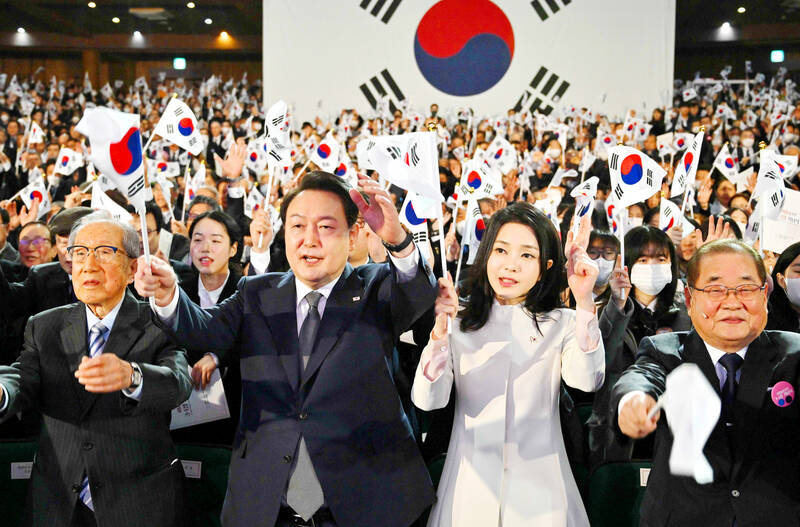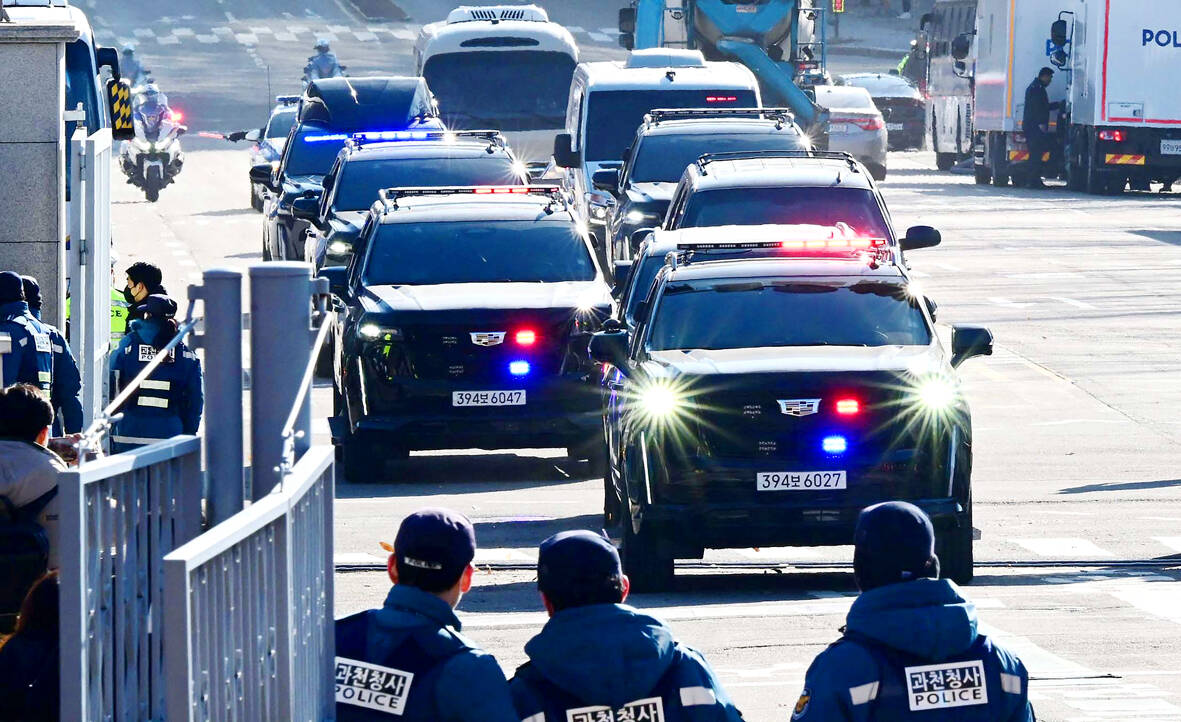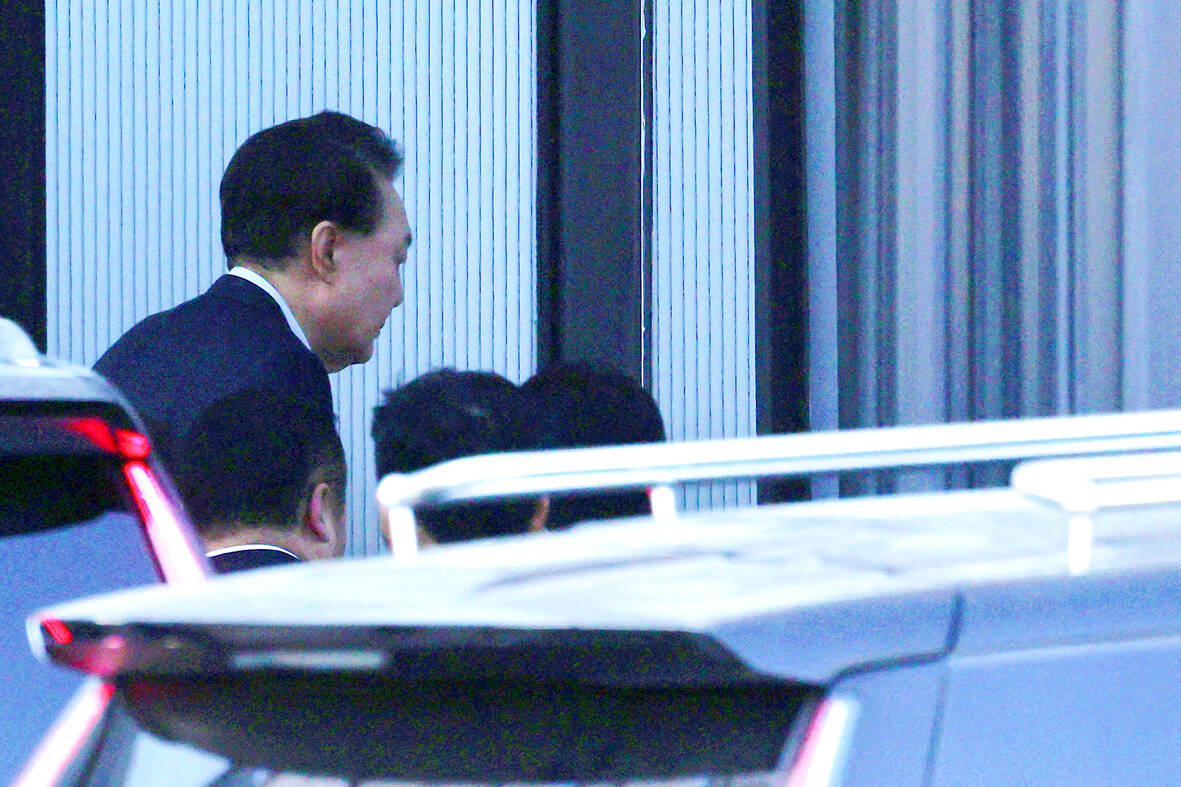South Korea’s Yoon Suk-yeol rose from star prosecutor to the presidency in just a few years, but after a series of scandals and a bungled martial law decree, he’s become the country’s first-ever sitting president to be arrested. The lurch back to South Korea’s dark days of military rule on Dec. 3 only lasted a few hours, and after a night of protests and high drama Yoon was forced into a U-turn by lawmakers.
He has since been impeached — pending a court trial that began this week — and resisted arrest until yesterday, when he backed down to investigators after a tense, weeks-long political standoff.
He said the investigators did not have the authority to arrest him and that he had only complied to avert “bloodshed” — but his name is now etched in history. As well as the first sitting South Korean president to be arrested, he is the third to be impeached by parliamentary vote, and, if upheld by the Constitutional Court, would be the second to be removed from office.

Photo: AFP
BORN IN DICTATORSHIP
Born in Seoul in 1960 months before a military coup, Yoon studied law and went on to become a public prosecutor and anti-corruption crusader.

Photo: AFP
He played an instrumental role in Park Geun-hye, South Korea’s first female president, being impeached in 2016 and later convicted for abuse of power and imprisoned.
As the country’s top prosecutor in 2019, he also indicted a senior aide of Park’s successor, Moon Jae-in, in a fraud and bribery case.
The conservative People Power Party (PPP), in opposition at the time, liked what they saw and convinced Yoon to become their presidential candidate.

Photo: AFP
He won in March 2022, beating Lee Jae-myung of the Democratic Party, but by the narrowest margin in South Korean history.
HALLOWEEN TO HANDBAG
Yoon was never much loved by the public, especially by women — he vowed on the campaign trail to abolish the ministry of gender equality — and scandals have come thick and fast.
This included his administration’s handling of a 2022 crowd crush during Halloween festivities that killed more than 150 people.
Voters have also blamed Yoon’s administration for food inflation, a lagging economy and increasing constraints on freedom of speech.
He was accused of abusing presidential vetoes, notably to strike down a bill paving the way for a special investigation into alleged stock manipulation by his wife, Kim Keon-hee.
Yoon suffered further reputational damage in 2023 when his wife was secretly filmed accepting a designer handbag worth US$2,000 as a gift. Yoon insisted it would have been rude to refuse.
His mother-in-law, Choi Eun-soon, was sentenced to one year in prison for forging financial documents in a real estate deal. She was released in May last year.
Yoon himself was the subject of a petition calling for his impeachment last year, which proved so popular the parliamentary Web site hosting it experienced delays and crashes.
‘YOU CAN SING’
As president, Yoon has maintained a tough stance against nuclear-armed North Korea and bolstered ties with Seoul’s traditional ally, the US.
In 2023, he sang Don McLean’s American Pie at the White House, prompting US President Joe Biden to respond: “I had no damn idea you could sing.”
But his efforts to restore ties with South Korea’s former colonial ruler, Japan, did not sit well with many at home.
Yoon has been a lame duck president since the opposition Democratic Party won a majority in parliamentary elections in April last year. They recently slashed Yoon’s budget.
In his televised address declaring martial law, Yoon railed against “anti-state elements plundering people’s freedom and happiness,” and his office has subsequently cast his imposition of martial law as a bid to break through legislative gridlock.
But to use his political difficulties as justification for imposing martial law for the first time in South Korea since the 1980s was absurd, an analyst said.
“Yoon invoked Article 77 of the South Korean constitution, which allows for proclaiming martial law but is reserved for ‘time of war, armed conflict or similar national emergency,’ none of which appears evident,” said Bruce Klingner, a senior research fellow at the Heritage Foundation.
“Yoon’s action is a damning reversal to decades of South Korean efforts to put its authoritarian past behind it,” he said.

The slashing of the government’s proposed budget by the two China-aligned parties in the legislature, the Chinese Nationalist Party (KMT) and Taiwan People’s Party (TPP), has apparently resulted in blowback from the US. On the recent junket to US President Donald Trump’s inauguration, KMT legislators reported that they were confronted by US officials and congressmen angered at the cuts to the defense budget. The United Daily News (UDN), the longtime KMT party paper, now KMT-aligned media, responded to US anger by blaming the foreign media. Its regular column, the Cold Eye Collection (冷眼集), attacked the international media last month in

On a misty evening in August 1990, two men hiking on the moors surrounding Calvine, a pretty hamlet in Perth and Kinross, claimed to have seen a giant diamond-shaped aircraft flying above them. It apparently had no clear means of propulsion and left no smoke plume; it was silent and static, as if frozen in time. Terrified, they hit the ground and scrambled for cover behind a tree. Then a Harrier fighter jet roared into view, circling the diamond as if sizing it up for a scuffle. One of the men snapped a series of photographs just before the bizarre

Feb. 10 to Feb. 16 More than three decades after penning the iconic High Green Mountains (高山青), a frail Teng Yu-ping (鄧禹平) finally visited the verdant peaks and blue streams of Alishan described in the lyrics. Often mistaken as an indigenous folk song, it was actually created in 1949 by Chinese filmmakers while shooting a scene for the movie Happenings in Alishan (阿里山風雲) in Taipei’s Beitou District (北投), recounts director Chang Ying (張英) in the 1999 book, Chang Ying’s Contributions to Taiwanese Cinema and Theater (打鑼三響包得行: 張英對台灣影劇的貢獻). The team was meant to return to China after filming, but

Power struggles are never pretty. Fortunately, Taiwan is a democracy so there is no blood in the streets, but there are volunteers collecting signatures to recall nearly half of the legislature. With the exceptions of the “September Strife” in 2013 and the Sunflower movement occupation of the Legislative Yuan and the aftermath in 2014, for 16 years the legislative and executive branches of government were relatively at peace because the ruling party also controlled the legislature. Now they are at war. The Democratic Progressive Party (DPP) holds the presidency and the Executive Yuan and the pan-blue coalition led by the